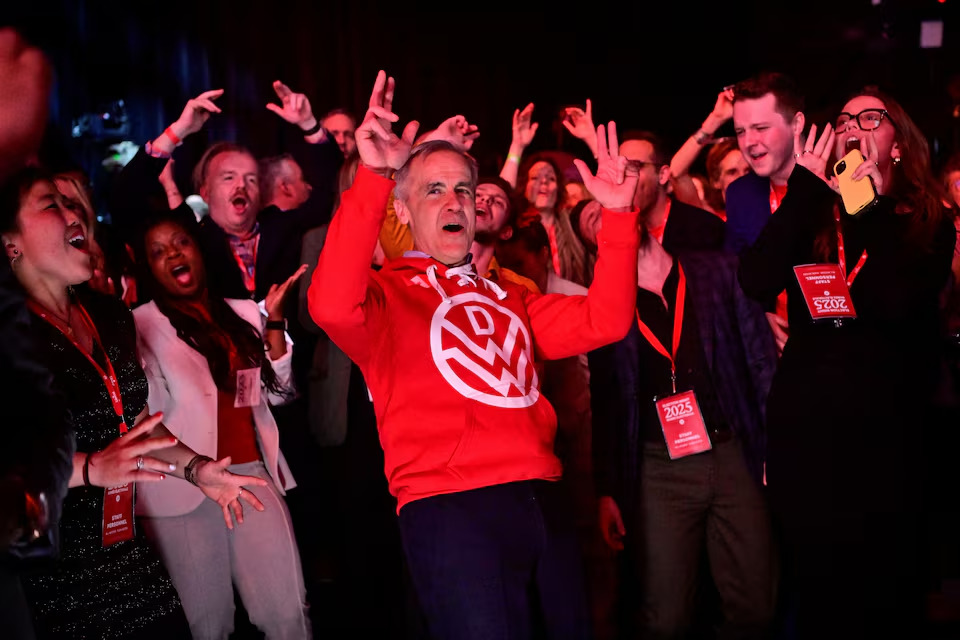Mark Carney’s, Canadian Prime Minister Liberals regained a major political influence to retain power in parliamentary elections, triggered by a backlash against United States President Donald Trump’s tariffs and responses on creating Canada the 51st U.S. state.
The Liberals were foremost or elected in 168 electoral districts, called a seats, followed by the Conservatives with 144, with votes still under tally.
Pierre Poilievre, Conservative leader, who just three months ago had seemed certain to sweep the polls, defeated his seat in the Ontario district of Carleton to Liberal Bruce Fanjoy.
The Liberals, who have been in power for over nine years, were 20 percentage points back in surveys in January prior the controversial Justin Trudeau declared he was resigning as prime minister and Donald Trump begun threatening tariffs and annexation.
“It was the ‘anybody-but-Conservative’ factor, it was the Trump tariff factor, and then it was the Trudeau departure … which enabled a lot of left-of-center voters and traditional Liberal voters to come back to the party,” president of the Angus Reid Institute polling firm Shachi Kurl stated.
Regardless the gains, the Liberals will not benefit the outright majority that Mark Carney had sought, to help him talk with Donald Trump on the tariffs threatening economy of Canada
The Liberals had required to win 172 of the House of Commons’ 343 seats for a majority that would permit them to govern without backing from a smaller party.
“Our old relationship with the United States, a relationship based on steadily increasing integration, is over,” Mark Carney stated in a victory speech in Ottawa. “The system of open global trade anchored by the United States, a system that Canada has relied on since the Second World War, a system that, while not perfect, has helped deliver prosperity for our country for decades, is over.”
“These are tragedies, but it’s also our new reality.”
Mark Carney stated the upcoming months could be challenging and need sacrifices.
Pierre Poilievre, Conservative leader conceded defeat to Mark Carney’s Liberals and stated his party could carry the government to account.
Ursula von der Leyen, European Commission President and Keir Starmer British Prime Minister congratulated Mark Carney.
“The bond between Europe and Canada is strong — and growing stronger,” von der Leyen said. “I look forward to working closely together, both bilaterally and within the G7. We’ll defend our shared democratic values, promote multilateralism, and champion free and fair trade.”
Keir Starmer stated he looked forward to Mark Carney’s leadership on global issues, and to ongoing to work closely “on defence, security, trade and investment”.
Mark Carney had pledged a tough approach with U.S. over its import tariffs and stated Canada would require to spend billions to lower its dependence on the United States But the right-of-center Conservatives, who urged for change following over nine years of Liberal rule, showed unexpected resilience.
Minority governments in Canada infrequently stay longer than 2-1/2 years. If Mark Carney strikes a agreement with the left-leaning New Democrats and the Greens, he will be able to accumulate a slim majority.
“That’s … very fragile,” said Philippe Lagasse, a professor and constitutional expert at Ottawa’s Carleton University. “Every confidence vote will be stressful. Every by-election will be quite consequential.”
Donald Trump’s threats ignited a phase of patriotism that amplified support for Mark Carney, a political newcomer who lastly led two G7 central banks.
Donald Trump re-appeared as a campaign factor previous week, announcing that he might boost a 25% tariff on Canadian-made cars because the United States does not need them. Trump stated prior he might use “economic force” to create Canada the 51st state.
Mark Carney has highlighted that his experience handling economic problems makes him the best leader to deal with Donald Trump, while Pierre Poilievre tapped into issues about the crime, cost of living and a housing crisis.
Donald Trump, in a social media post on Monday, reaffirmed his call for Canada to turn in to 51st state.
“Good luck to the Great people of Canada,” Trump stated. “Elect the man who has the strength and wisdom to cut your taxes in half, increase your military power, for free, to the highest level in the World, have your Car, Steel, Aluminum, Lumber, Energy, and all other businesses, QUADRUPLE in size, WITH ZERO TARIFFS OR TAXES, if Canada becomes the cherished 51st. State of the United States of America. No more artificially drawn line from many years ago.”
Tensions with the United States have caused supporters of two smaller parties, the left-leaning New Democratic Party and the separatist Bloc Quebecois, to transfer to the Liberals. Jagmeet Singh, NDP leader conceded loss in his own district and stated he decided to quit as party leader.
The Conservatives emerged on track to make growth in the seat-rich Toronto region to avoidt a Liberal majority government, but Pierre Poilievre was trailing in his own Ottawa-area district, with votes still being processed.
“We didn’t quite get over the finish line yet,” Pierre Poilievre said his supporters in Ottawa. “We know that change is needed, but change is hard to come by. It takes time.”
The Liberals are the last party to victory four consecutive elections in Canada, achieving the feat in 2004. (Forelines)

